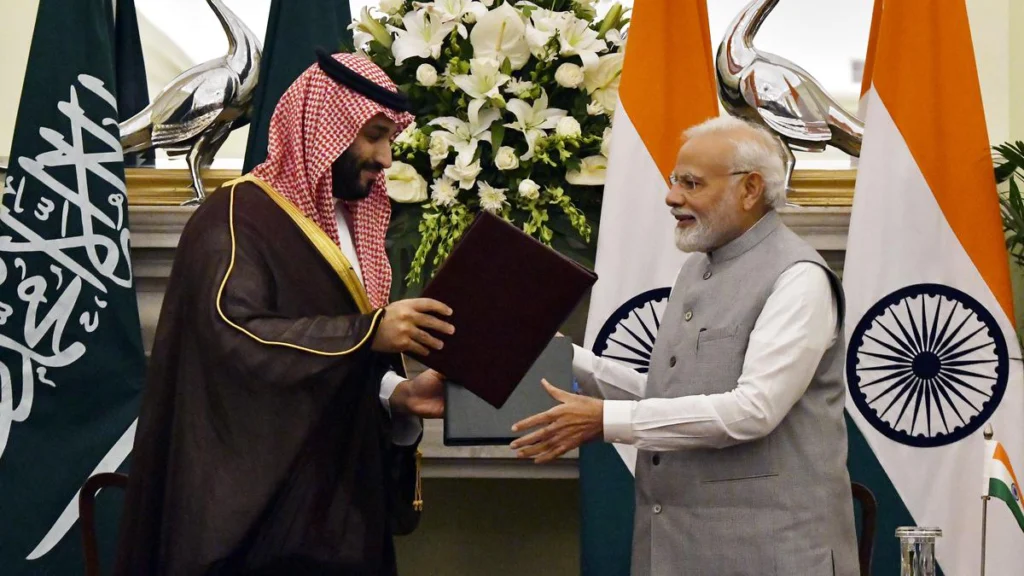PM Modi’s Saudi trip | Nations to ink 6 pacts, PM to discuss Hajj quota with Crown Prince

PM Modi Begins Historic Visit to Saudi Arabia, First Indian PM in 40 Years to Visit Jeddah
Prime Minister Narendra Modi embarked on a landmark two-day visit to Saudi Arabia on Tuesday, April 22, 2025, at the invitation of Crown Prince Mohammed bin Salman. His visit, focused on deepening bilateral ties, trade, energy, and strategic cooperation, also marks the first time in 40 years that an Indian Prime Minister has visited Jeddah — Saudi Arabia’s second-largest city and a major commercial hub.
The trip reflects a growing partnership between India and the Gulf nation, and expectations are high as both sides prepare to sign at least six significant memoranda of understanding (MoUs). Talks to finalise a few more agreements were still ongoing late Monday night, according to sources familiar with the preparations.
A Visit Decades in the Making
Jeddah has long been a strategic gateway for Saudi Arabia, particularly for commerce and diplomatic outreach. However, no Indian Prime Minister has visited the city since 1985, making Mr. Modi’s arrival a significant diplomatic event.
Upon landing in Jeddah, PM Modi received a warm ceremonial welcome, with top Saudi officials, diplomats, and members of the Indian diaspora gathered at the airport. Saudi media broadcast the arrival live, reflecting the importance Riyadh places on this bilateral engagement.
Indian flags fluttered alongside Saudi ones in Jeddah, and several major buildings, including the King Abdulaziz International Conference Centre, were illuminated in the tricolour of India in a gesture of friendship.
Key Agendas on the Table
The visit is expected to focus on multiple high-priority areas, including:
- Energy cooperation
- Technology and innovation partnerships
- Investment opportunities under the Saudi Vision 2030 plan
- Defence and security collaboration
- Labour mobility and welfare of the Indian diaspora
- Climate action and green energy
Saudi Arabia is India’s fourth-largest trading partner, and India imports a significant portion of its crude oil from the Kingdom. However, the relationship has expanded beyond hydrocarbons in recent years, with increased investments in startups, IT infrastructure, and clean energy ventures.
According to Indian foreign ministry officials, the visit aims to consolidate existing agreements and open new channels for economic collaboration.
Six MoUs and More in the Pipeline
While officials remained tight-lipped about the specific MoUs to be signed, sources suggest that they will likely cover:
- Digital infrastructure cooperation
- Strategic energy dialogue
- Innovation and AI collaboration
- Tourism and cultural exchanges
- Space research
- Investment facilitation for Indian startups
Additional agreements may address defence industry cooperation, cybersecurity frameworks, and clean hydrogen energy development, which are fast-emerging focus areas for both countries.
Ties Strengthened by Shared Interests
Over the past decade, India and Saudi Arabia have grown closer through shared economic goals and regional security interests. PM Modi and Crown Prince Mohammed bin Salman have met on multiple occasions during international summits, and their personal rapport has helped fast-track joint initiatives.
Saudi Arabia’s Vision 2030, which aims to diversify the Kingdom’s economy away from oil, aligns well with India’s push toward Make in India, Digital India, and its green energy roadmap. With its vast skilled workforce and thriving tech sector, India presents a natural partner for Riyadh’s ambitious modernization plans.
Indian Diaspora in Focus
During his visit, PM Modi is also expected to interact with members of the Indian diaspora in Jeddah, many of whom are employed in healthcare, construction, hospitality, and technology sectors. Over 2.6 million Indians live and work in Saudi Arabia, making them one of the largest expatriate communities in the Gulf.
The Indian government has long prioritized the welfare of its overseas citizens, and agreements around labour mobility, skill training, and worker protection are likely to feature prominently in discussions.
The Ministry of External Affairs has also hinted that the leaders may announce new visa relaxations and fast-track services for Indian professionals and businesspeople.
A Strategic Partnership in the Making
While India shares close ties with other Gulf countries like the UAE and Qatar, its relationship with Saudi Arabia holds a unique strategic weight. The Kingdom plays a central role in the Islamic world, in OPEC, and in shaping West Asian geopolitics.
India, on the other hand, has grown as a global economic powerhouse, an emerging technology leader, and a key player in Indo-Pacific security. The two countries increasingly find themselves aligned on global challenges like climate change, counter-terrorism, and securing energy routes.
Sources from both sides suggest that the current visit could lay the foundation for elevating the relationship to a strategic comprehensive partnership, on par with India’s ties with countries like France, Japan, and the UAE.
Symbolism and Substance
Observers see PM Modi’s decision to visit Jeddah — rather than restricting his trip to Riyadh — as a symbolic gesture that India is ready to engage with the entire Saudi ecosystem, including its commercial, diplomatic, and religious spheres.
Jeddah is not only a commercial capital but also the gateway to Mecca and Medina, drawing millions of pilgrims every year. The Indian government’s attention to the Haj pilgrimage and support for Indian Muslims travelling for it has been a quiet but consistent feature of its diplomacy with Saudi Arabia.
Conclusion: A Step Forward in Indo-Saudi Relations
As Prime Minister Narendra Modi begins this historic two-day visit to Jeddah, all eyes are on the outcomes that could shape a new era of Indo-Saudi collaboration. With MoUs lined up, strategic dialogues scheduled, and business leaders on both sides eager to deepen ties, the visit could redefine not just bilateral relations but also India’s broader engagement in the Gulf region.
Whether through economic cooperation, cultural exchange, or diplomatic alignment, this visit may mark the beginning of a stronger, future-focused relationship between India and Saudi Arabia.






